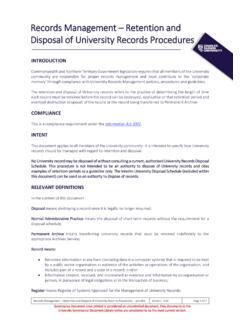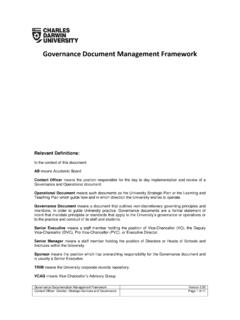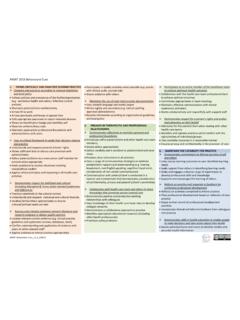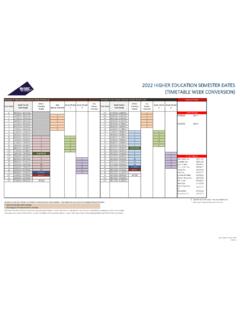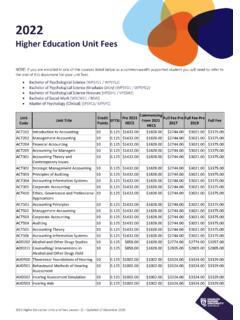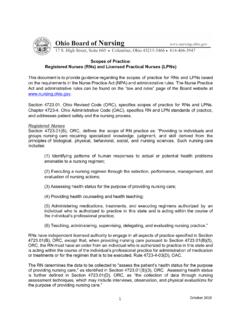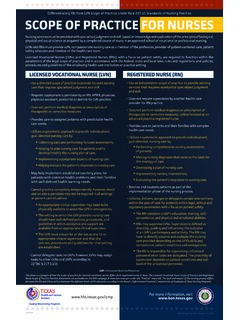Transcription of Registered nurse standards for practice
1 Registered nurse standards for practice Effective date 1 June 2016. Introduction Registered nurse (RN) practice is person-centred and evidence-based with preventative, curative, formative, supportive, restorative and palliative elements. RNs work in therapeutic and professional relationships with individuals, as well as with families, groups and communities. These people may be healthy and with a range of abilities, or have health issues related to physical or mental illness and/or health challenges. These challenges may be posed by physical, psychiatric, developmental and/or intellectual disabilities. The Australian community has a rich mixture of cultural and linguistic diversity, and the Registered nurse standards for practice are to be read in this context.
2 RNs recognise the importance of history and culture to health and wellbeing. This practice reflects particular understanding of the impact of colonisation on the cultural, social and spiritual lives of Aboriginal and Torres Strait Islander peoples, which has contributed to significant health inequity in Australia. As regulated health professionals, RNs are responsible and accountable to the Nursing and Midwifery Board of Australia (NMBA). These are the national Registered nurse standards for practice for all RNs. Together with NMBA standards , codes and guidelines, these Registered nurse standards for practice should be evident in current practice , and inform the development of the scopes of practice and aspirations of RNs.
3 RN practice , as a professional endeavour, requires continuous thinking and analysis in the context of thoughtful development and maintenance of constructive relationships. To engage in this work, RNs need to continue to develop professionally and maintain their capability for professional practice . RNs determine, coordinate and provide safe, quality nursing. This practice includes comprehensive assessment, development of a plan, implementation and evaluation of outcomes. As part of practice , RNs are responsible and accountable for supervision and the delegation of nursing activity to enrolled nurses (ENs) and others. practice is not restricted to the provision of direct clinical care.
4 Nursing practice extends to any paid or unpaid role where the nurse uses their nursing skills and knowledge. This practice includes working in a direct non-clinical relationship with clients, working in management, administration, education, research, advisory, regulatory, policy development roles or other roles that impact on safe, effective delivery of services in the profession and/or use of the nurse 's professional skills. RNs are responsible for autonomous practice within dynamic systems, and in relationships with other health care professionals. How to use these standards The Registered nurse standards for practice consist of the following seven standards : 1.
5 Thinks critically and analyses nursing practice . 2. Engages in therapeutic and professional relationships. 3. Maintains the capability for practice . 4. Comprehensively conducts assessments. 5. Develops a plan for nursing practice . Nursing and Midwifery Board of Australia Box 9958 | Melbourne VIC 3001 | | 1300 419 495. 6. Provides safe, appropriate and responsive quality nursing practice . 7. Evaluates outcomes to inform nursing practice . The above standards are all interconnected (see Figure 1). standards one, two and three relate to each other, as well as to each dimension of practice in standards four, five, six and seven. Figure 1: Registered nurse standards Each standard has criteria that specify how that standard is demonstrated.
6 The criteria are to be interpreted in the context of each RN's practice . For example, all RNs will, at various times, work in partnerships and delegate responsibilities, however not every RN will delegate clinical practice to enrolled nurses. The criteria are not exhaustive and enable rather than limit the development of individual Registered nurse scopes of practice . The Registered nurse standards for practice are for all RNs across all areas of practice . They are to be read in conjunction with the applicable NMBA companion documents such as the standards , codes and guidelines, including the Code of professional conduct for nurses, Code of ethics for nurses, National framework for the development of decision-making tools for nursing and midwifery practice , Supervision guidelines for nursing and midwifery, and Guidelines for mandatory notifications.
7 The glossary is also important for understanding how key terms are used in these standards . Registered nurse standards for practice Page 2 of 8. Registered nurse standards for practice Standard 1: Thinks critically and analyses nursing practice RNs use a variety of thinking strategies and the best available evidence in making decisions and providing safe, quality nursing practice within person-centred and evidence-based frameworks. The Registered nurse : accesses, analyses, and uses the best available evidence, that includes research findings, for safe, quality practice develops practice through reflection on experiences, knowledge, actions, feelings and beliefs to identify how these shape practice respects all cultures and experiences, which includes responding to the role of family and community that underpin the health of Aboriginal and Torres Strait Islander peoples and people of other cultures complies with legislation, regulations, policies.
8 Guidelines and other standards or requirements relevant to the context of practice when making decisions uses ethical frameworks when making decisions maintains accurate, comprehensive and timely documentation of assessments, planning, decision- making, actions and evaluations, and contributes to quality improvement and relevant research. Standard 2: Engages in therapeutic and professional relationships RN practice is based on purposefully engaging in effective therapeutic and professional relationships. This includes collegial generosity in the context of mutual trust and respect in professional relationships. The Registered nurse : establishes, sustains and concludes relationships in a way that differentiates the boundaries between professional and personal relationships communicates effectively, and is respectful of a person's dignity, culture, values, beliefs and rights recognises that people are the experts in the experience of their life provides support and directs people to resources to optimise health-related decisions advocates on behalf of people in a manner that respects the person's autonomy and legal capacity uses delegation, supervision, coordination.
9 Consultation and referrals in professional relationships to achieve improved health outcomes actively fosters a culture of safety and learning that includes engaging with health professionals and others, to share knowledge and practice that supports person-centred care participates in and/or leads collaborative practice , and reports notifiable conduct of health professionals, health workers and others. Standard 3: Maintains the capability for practice RNs, as regulated health professionals, are responsible and accountable for ensuring they are safe, and have the capability for practice . This includes ongoing self-management and responding when there is concern about other health professionals' capability for practice .
10 RNs are responsible for their professional development and contribute to the development of others. They are also responsible for providing information and education to enable people to make decisions and take action in relation to their health. Registered nurse standards for practice Page 3 of 8. The Registered nurse : considers and responds in a timely manner to the health and wellbeing of self and others in relation to the capability for practice provides the information and education required to enhance people's control over health uses a lifelong learning approach for continuing professional development of self and others accepts accountability for decisions, actions, behaviours and responsibilities inherent in their role, and for the actions of others to whom they have delegated responsibilities seeks and responds to practice review and feedback actively engages with the profession.
